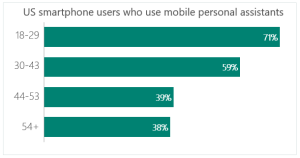With Google’s push for better content and a heavy focus on mobile, it is important to capitalize on how people are searching. According to PEW research, 43% global median of the population report having a smartphone. With numbers this high and Millennials primarily using mobile for search, games, and apps, it’s important to capitalize on the mobile trend.
Where does voice come in? With Google voice search, Apple’s Siri, Microsoft’s Cortana, Amazon’s Echo and more being developed, voice search is important. According to research from Moz, a diverse demographic is using voice search and personal assistants:
So how does voice search affect your traffic?
- People use more natural sentences when speaking instead of typed query language, such as “Where is a car dealership near me?” “car dealer”
- A voice search query can sometimes indirectly lead to a search result with ads being served as well.
- The successful voice searches, the ones that get the most volume, impressions and clicks, are the ones with 3 words in the keyword or query.
- g., Chrysler dealership near me
- Mobile voice search is three times more likely to be local-based than text search. This is closely related to the fact that most smartphone searches are also local.
Google’s search results use your location to help determine the best results, and Google Maps pulls data from Google My Business, so it’s important to have all of the correct information about your business online and to optimize for nearby areas. At L2TMedia, we have seen the rising trend of mobile usage and have been at the forefront to capitalize on voice search. We incorporate voice search terms within our content and meta data to help bring relevancy to our automotive clients.
Do you have questions for our experts? Ask here!


